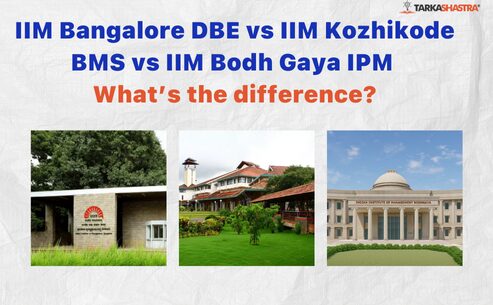Why Understanding Total Marks Matters?
For any serious IPMAT aspirant, understanding the total marks and section-wise weightage is not just helpful—it’s non-negotiable. Why? Because of your preparation strategy, time allocation during the paper, and even the cut-off you’re aiming to beat. Everything hinges on how the exam is structured.
Many students start solving mocks or studying random topics without knowing which sections hold more marks or have negative marks. This not only wastes effort but also leads to skewed preparation.
Whether you’re targeting IIM Indore or IIM Rohtak, both IPMAT exams are unique in structure, marking scheme, and sectional design. A one-size-fits-all approach won’t work.
This blog will help you:
- Understand the total marks for each IPMAT 2026 exam
- Break down the section-wise weightage and marking schemes
- Compare Indore and Rohtak formats to refine your strategy
By the end, you’ll be clear on:
- How many questions do you need to get right
- Which sections matter the most
- How to plan your mocks, revisions, and time management for maximum ROI
Let’s dive deep into the blueprint of IPMAT Marks 2026.
IPMAT 2026: Exam Overview
The Integrated Programme in Management Aptitude Test (IPMAT) is your gateway to prestigious 5-year management programs at IIMs. While IIM Indore and IIM Rohtak both conduct IPMAT, the exam structure, total marks, and sectional breakdown vary significantly.
Before diving into section-wise marks, here’s a quick overview of both exams:
What is IPMAT?
IPMAT is an entrance test for the 5-year Integrated Programme in Management (IPM) offered by:
- IIM Indore
- IIM Rohtak
- (and others like IIM Ranchi, Jammu & Bodh Gaya, through JIPMAT)
In this blog, we’ll focus on IPMAT Indore and IPMAT Rohtak, as both conduct separate exams with distinct patterns.
IPMAT Indore 2026: Exam Structure at a Glance
| Component | Details |
| Conducting Body | IIM Indore |
| Number of Sections | 3 (QA – SA, QA – MCQ, VA – MCQ) |
| Total Questions | 90 |
| Total Marks | 360 |
| Duration | 120 minutes |
| Sectional Time Limit | Yes (40 mins per section) |
| Negative Marking | Yes (Only in MCQs: -1) |
IPMAT Rohtak 2026: Exam Structure at a Glance
| Component | Details |
| Conducting Body | IIM Rohtak |
| Number of Sections | 3 (QA, LR, VA – all MCQ) |
| Total Questions | 120 |
| Total Marks | 480 |
| Duration | 120 minutes |
| Sectional Time Limit | No |
| Negative Marking | Yes (-1 for wrong answers) |
Key Differences You Should Know
- IIM Indore includes a Short Answer (SA) section in Quant, with no negative marking.
- IIM Rohtak features a Logical Reasoning section, which Indore does not.
- Only Indore has sectional time limits, so the time management strategy differs drastically.
- The total marks are also different: 360 (Indore) vs 480 (Rohtak).
Knowing these differences helps you tailor your prep based on your target college—and avoid the trap of uniform prep for two very different exams.
IPMAT Indore 2026: Section-Wise Weightage & Marking Scheme
The IPMAT Indore exam is known for its unique structure—especially the inclusion of a Short Answer (SA) section, which makes it different from most aptitude tests. Understanding the marks distribution and time allocation per section will help you craft a precise prep and attempt strategy.
Section-Wise Breakdown: Number of Questions & Marks
| Section Name | Number of Questions | Marks per Question | Total Marks | Negative Marking |
| Quantitative Ability (SA) | 15 | +4 | 60 | ❌ None |
| Quantitative Ability (MCQ) | 30 | +4 | 120 | ✅ -1 |
| Verbal Ability (MCQ) | 45 | +4 | 180 | ✅ -1 |
| Total | 90 | — | 360 | — |
Sectional Time Limits
Unlike most entrance exams, IPMAT Indore has strict sectional time limits, which means you cannot switch between sections during the test.
| Section | Time Allotted |
| Quantitative Ability (SA) | 40 minutes |
| Quantitative Ability (MCQ) | 40 minutes |
| Verbal Ability (MCQ) | 40 minutes |
| Total Time | 120 minutes |
This makes time management crucial. You must be adept at solving within the given time slot because even if you finish early, you can’t use that time in another section.
Marking Scheme Explained
- Correct Answer (MCQ & SA): +4 marks
- Wrong Answer (MCQ only): -1 mark
- Wrong Answer (SA): No negative marking
Strategy Tip: Focus on attempting all 15 SA questions even if unsure—no negative marking means no risk!
What Does This Mean for You?
- Quant is split into two formats: MCQs (with -1 penalty) and SAs (risk-free but tougher).
- Verbal is the highest-weight section (180 marks)—neglecting it can be costly.
- If quant is your strong suit, SA can be your scoring zone without fear of penalty.
- Sectional time limits mean you must practice in timed blocks, simulating real exam conditions.
IPMAT Rohtak 2026: Section-Wise Weightage & Marking Scheme
Unlike Indore, the IPMAT Rohtak 2026 exam follows a more traditional structure with all questions in multiple-choice format (MCQs) and no sectional time limits. However, it balances the three sections—Quantitative Ability, Logical Reasoning, and Verbal Ability—equally, each carrying the same weight.
This structure makes it ideal for students who prefer flexibility in time management and have a balanced strength across all three domains.
Section-Wise Breakdown: Number of Questions & Marks
| Section Name | Number of Questions | Marks per Question | Total Marks | Negative Marking |
| Quantitative Ability | 40 | +4 | 160 | ✅ -1 |
| Logical Reasoning | 40 | +4 | 160 | ✅ -1 |
| Verbal Ability | 40 | +4 | 160 | ✅ -1 |
| Total | 120 | — | 480 | — |
Time Management Advantage: No Sectional Time Limits
| Total Exam Duration | Section Switching | Individual Time Allocation |
| 120 minutes | ✅ Allowed | ❌ No fixed limit per section |
This means you can spend more time on your stronger sections or adjust mid-way based on your pace. But remember—balanced scoring is crucial since all three sections carry equal marks.
Marking Scheme
- Correct Answer: +4 marks
- Wrong Answer: -1 mark
- Unattempted: 0 marks
What Makes Rohtak Different?
- Logical Reasoning section is present (unlike in Indore)
- All questions are MCQs, including Quant
- Equal weightage makes it ideal for generalists but risky for students with intense/weak extremes
- The total marks are 480, which means a higher raw score potential—but also tougher competition
Strategy Tip: If you’re unsure which IIM to prioritize, practicing for Rohtak first gives you broader coverage since it includes all 3 common aptitude areas.
Comparison: IPMAT Indore vs IPMAT Rohtak – Total Marks & Structure
If you’re preparing for both exams, understanding the key structural differences between IPMAT Indore and IPMAT Rohtak is essential. While both are 120-minute aptitude tests for IIMs, they test different skill sets, follow different marking schemes, and carry different total marks.
Here’s a crisp head-to-head comparison to help you realign your preparation strategy accordingly:
Side-by-Side Comparison Table
| Feature | IPMAT Indore | IPMAT Rohtak |
| Conducting Body | IIM Indore | IIM Rohtak |
| Total Questions | 90 | 120 |
| Total Marks | 360 | 480 |
| Sections | QA (SA), QA (MCQ), Verbal (MCQ) | QA, LR, Verbal (All MCQ) |
| Logical Reasoning Section | ❌ No | ✅ Yes |
| Quant Split Format | SA + MCQ | Only MCQ |
| Verbal Weightage | Highest (180/360 marks) | Equal (160/480 marks) |
| Sectional Time Limit | ✅ Yes (40 mins each) | ❌ No sectional limits |
| Negative Marking | ✅ Yes (Only for MCQs: -1) | ✅ Yes (All MCQs: -1) |
| Marking (Per Question) | +4 / -1 (MCQs), +4 / 0 (SA) | +4 / -1 (All MCQs) |
| Risk-Free Attempts | SA Section (15 questions, no -ve marking) | None |
| Overall Difficulty Trend | Quant-heavy, time-restricted | Balanced, logic-oriented, time-flexible |
How This Comparison Should Guide Your Prep
- Stronger in Verbal and Quant? → Focus on IPMAT Indore.
- Stronger in Reasoning and Balanced Sections? → IPMAT Rohtak may suit you better.
- Don’t like time pressure? → Rohtak’s lack of sectional timing gives breathing room.
- Like predictable patterns? → Indore’s fixed section timings help build a routine.
Pro Tip: Attempt mocks of both exams in real conditions to test where you naturally perform better—and then double down on that track!
IPMAT 2026 Exam Components and Weightage
IIM Indore
The admission process for IIM Indore’s IPM program is based on two key stages: the Aptitude Test and the Personal Interview.
Aptitude Test (65% Weightage):
- The test comprises three sections — Quantitative Ability (MCQ), Quantitative Ability (Short Answer), and Verbal Ability (MCQ).
- The total duration is 120 minutes, with 40 minutes allotted to each section.
Personal Interview (35% Weightage):
- Candidates are evaluated on their academic profile, general awareness, current affairs, and analytical thinking during the PI round.
| Component | Weightage (%) |
| Aptitude Test Score | 65 |
| Personal Interview | 35 |
| Composite Score | 100 |
IIM Rohtak
IIM Rohtak follows a more comprehensive evaluation system by incorporating academic performance along with test and interview scores.
| Component | Weightage (%) |
| IPMAT Aptitude Test Score (2025) | 55 |
| Personal Interview | 15 |
| Class 10th (or equivalent) Marks | 10 |
| Class 12th (or equivalent) Marks | 20 |
| Total | 100 |
The revised weightage structure by IIM Rohtak emphasizes academic consistency, making it essential for students to focus on their past performance along with test preparation.
Importance of Section-Wise Weightage in Preparation Strategy
Knowing what to study is essential. But knowing how much weight each section carries? That’s your real power move.
When you understand the section-wise mark distribution, you no longer study blindly. You study strategically—focusing on the highest-scoring areas, managing your time better, and planning mock test attempts with precision.
Let’s break down how this knowledge can directly impact your preparation for IPMAT 2026:
1. Prioritize Based on Weightage
If you’re preparing for IPMAT Indore:
- Verbal Ability carries 180/360 marks – that’s 50% of the paper!
- Ignoring Verbal just because you like Math is like training only one leg for a marathon.
For IPMAT Rohtak:
- All three sections carry equal marks (160 each).
- This means you can’t afford to neglect any one section, especially Logical Reasoning, which isn’t part of Indore’s syllabus.
2. Align Your Study Hours Accordingly
| Section | % Weightage (Indore) | % Weightage (Rohtak) | Preparation Tip |
| Quant (Total) | ~50% | ~33% | Practice both MCQ & SA formats |
| Verbal Ability | 50% | ~33% | Daily reading, vocab, grammar drills |
| Logical Reasoning | ❌ Not Applicable | ~33% | Focus on puzzles, series, arrangements |
Use this table to allocate your weekly prep time. Don’t overcommit to one section at the cost of another.
Plan Mock Tests With Marks in Mind
- Don’t just look at the total score—analyze section-wise accuracy and time spent.
- For Indore, if you’re scoring low in Verbal, your chances are immediately hit.
- For Rohtak, if one section is 20+ marks behind the others, your average percentile dips drastically.
Target Cutoffs Based on Sectional Weightage
- Most IIMs apply sectional cutoffs, especially Indore.
- If you bomb just one section, even a high overall score won’t save you.
- Knowing where to make up marks—and where not to take risks—gives you a competitive edge.
Bottom Line?
Section-wise weightage = roadmap. Don’t just prepare hard. Prepare smart. Because every extra mark in a high-weight section pushes you closer to IIM.
Preparation Tips to Excel in IPMAT 2026
Quantitative Ability
- Focus on strengthening numerical abilities and problem-solving skills to achieve a high score in the IPMAT total marks.
- Adopt a comprehensive preparation strategy by practicing a diverse range of quantitative topics to effectively tackle both MCQs and short-answer questions.
- Build a strong foundation in Arithmetic, Algebra, Geometry, and the Number System.
Verbal Ability
- This section assesses comprehension and language proficiency, playing a critical role in the overall score for IPMAT Indore.
- Regular engagement with diverse reading materials and vocabulary exercises will enhance performance.
- Improve reading comprehension skills by consistently reading newspapers, novels, and editorials.
Logical Reasoning
- Concentrate on essential topics such as Blood Relations, Syllogisms, Coding-Decoding, and Puzzles.
- Develop analytical skills by practicing problems related to seating arrangements and direction sense.
- Focus on areas like statement assumption, cause-effect relationships, and logical inferences.
- Review past logical reasoning questions to identify recurring patterns.
Mock Tests and Time Management
- Regularly attempt mock tests to become familiar with the time constraints and pressure of the exam environment.
- Develop effective strategies to manage sections efficiently, ensuring optimal performance across all areas.
- It is recommended that full-length IPMAT mock tests from Tarkashastra be taken to simulate the actual test conditions.
With IPMAT total marks set at 360 for Indore and 480 for Rohtak, the marking system of the IPMAT 2026 presents a rigorous challenge. This examination provides a structured framework for applicants, emphasizing analytical and verbal competencies.
Mastering the total marks and exam pattern is essential for students aspiring to secure admission to prestigious institutions. A thorough understanding of the IPMAT structure is key to adequate preparation and confidence during the examination.
Final Thoughts: Master the Structure, Maximize Your Score
When it comes to cracking competitive exams like IPMAT, the difference between a good score and a great score often lies in understanding the blueprint—and that starts with the total marks and section-wise weightage.
Whether you’re aiming for IIM Indore or IIM Rohtak, blindly studying everything won’t help. You need to align your efforts with the structure:
- Know which sections carry more marks.
- Know where you can afford to make mistakes (SA section in Indore).
- Know where every mark counts (Rohtak’s evenly weighted pattern).
This knowledge helps you:
- Plan better
- Revise smarter
- Attempt wisely
- Analyze mocks effectively
| IPMAT Indore aspirants should focus heavily on Verbal Ability and mastering both MCQ and SA Quant formats under timed conditions. |
| IPMAT Rohtak aspirants should train for consistency across all three sections, especially Logical Reasoning, and get comfortable with switching sections without losing focus. |
Ultimately, scoring high is a mix of skill + strategy. And strategy comes from knowing exactly what you’re dealing with.
Need expert guidance?
Join Tarkashastra’s IPMAT Coaching Program for:
- Daily live concept sessions
- Doubt-solving & mentorship from top B-school alumni
- Real-exam-level mock tests with detailed analysis
- Personalized preparation plans tailored to your target IIM
Let’s not just aim to “appear” for IPMAT. Let’s aim to crack it with clarity and confidence.
Explore IPMAT Coaching at Tarkashastra
Frequently Asked Questions (FAQs)
- What is the total number of marks in IPMAT Indore 2026?
IPMAT Indore has a total of 360 marks spread across three sections—Quantitative Ability (MCQ), Quantitative Ability (SA), and Verbal Ability. Each correct answer fetches +4 marks, with negative marking only in MCQs.
- What is the total number of marks in IPMAT Rohtak 2026?
IPMAT Rohtak scored out of 480 marks. It has 120 questions across three sections, each carrying equal weightage—Quant, Logical Reasoning, and Verbal, with +4 for correct and -1 for wrong answers.
- How many sections are there in IPMAT Indore?
IPMAT Indore has three sections: Quantitative Ability (Short Answer), Quantitative Ability (MCQ), and Verbal Ability (MCQ). The two types of quant sections make it unique.
- Is there a Logical Reasoning section in IPMAT Indore?
No, IPMAT Indore does not include a Logical Reasoning section. It focuses more on advanced-level Quant and Verbal Ability.
- How many sections are there in IPMAT Rohtak?
IPMAT Rohtak has three balanced sections—Quantitative Ability, Logical Reasoning, and Verbal Ability. Each section contains 40 MCQs and contributes equally to the final score.
- Is there a negative marking in IPMAT Indore 2026?
Yes, but only for the MCQ sections. You lose 1 mark for each incorrect MCQ, while the Short Answer (SA) section has no negative marking.
- Is there a negative marking in IPMAT Rohtak 2026?
Yes, all questions in IPMAT Rohtak are MCQs, and each incorrect answer results in a -1 mark deduction, making accuracy a crucial factor.
- How many questions are asked in IPMAT Indore?
The total number of questions in IPMAT Indore is 90: 15 SA in Quant, 30 MCQs in Quant, and 45 MCQs in Verbal Ability.
- How many questions are asked in IPMAT Rohtak?
IPMAT Rohtak includes 120 MCQs, with 40 questions each in Quant, Logical Reasoning, and Verbal Ability. All questions carry equal weight.
- Are the marks distributed equally across sections in both exams?
No. In Indore, Verbal has a higher weightage (180 marks). At the same time, in Rohtak, all sections carry equal weight (160 marks each), encouraging a balanced approach.
- Does IPMAT Indore have sectional time limits?
Yes. Each section in IPMAT Indore is timed for 40 minutes, and students must attempt them in a fixed order. You cannot switch between sections.
- Does IPMAT Rohtak have sectional time limits?
No. The entire exam lasts 120 minutes without any sectional restrictions. You can move between questions and sections freely during the test.
- What is the marking scheme for correct answers in both exams?
Both exams follow a +4 for every correct answer policy. Indore gives this for both MCQ and SA questions, while Rohtak awards it for all MCQs.
- How are the Short Answer (SA) questions different in IPMAT Indore?
SA questions require you to type a numerical answer without options. They carry +4 marks like MCQs but have no negative marking, making them a safe scoring zone.
- What is a good score in IPMAT Indore for IIM Indore shortlisting?
A competitive score typically ranges around 220+ out of 360. Still, it can vary depending on the paper’s difficulty and the competition each year.
- What is a good score in IPMAT Rohtak for IIM Rohtak shortlisting?
A score of around 300–330 out of 480 is considered strong for general category aspirants aiming for IIM Rohtak, though it may change annually.
- Do both exams have equal difficulty levels?
Not exactly. IPMAT Indore is usually more Quant-heavy and conceptual. At the same time, IPMAT Rohtak is more balanced with a mix of Reasoning and easier quant.
- Do I need to prepare for Logical Reasoning if I’m only targeting IPMAT Indore?
No. Logical Reasoning has not been tested in IPMAT Indore. You can skip this section unless you are also preparing for Rohtak or other BBA entrance exams.
- Are there sectional cut-offs in IPMAT exams?
Yes, especially in IPMAT Indore. IIM Indore generally applies sectional as well as overall cut-offs, so you must perform well in each section, not just overall.
- Can I prepare for both exams together?
Yes. The Quant and Verbal sections overlap, so your core prep remains similar. Just add Logical Reasoning practice for Rohtak and manage time flexibility accordingly.







